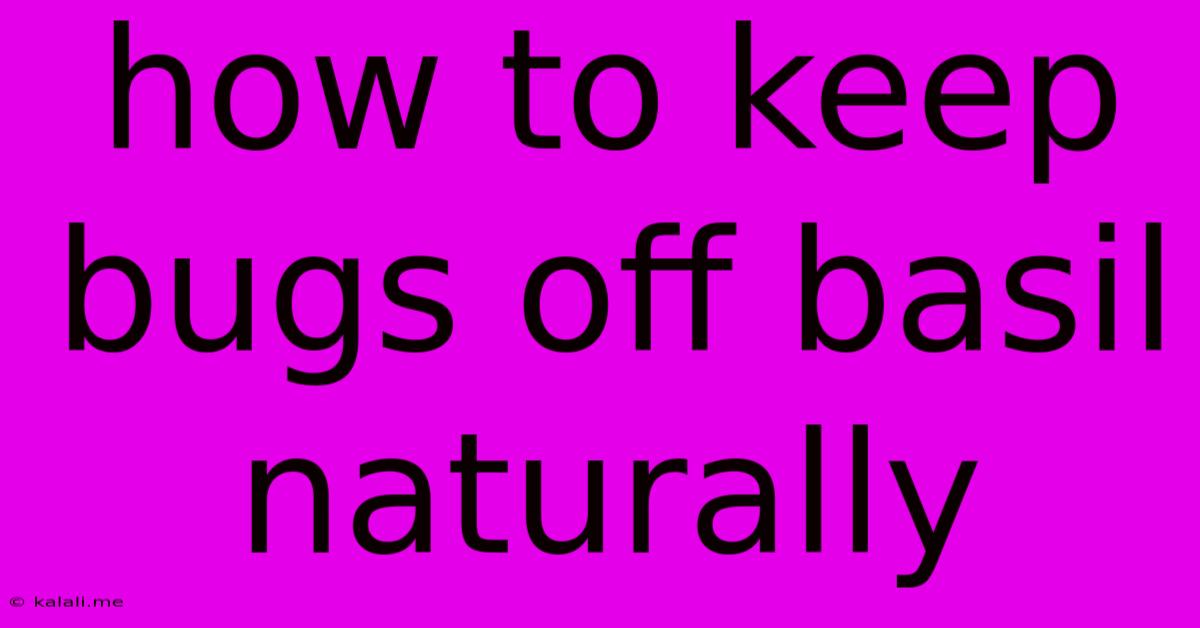How To Keep Bugs Off Basil Naturally
Kalali
Jun 04, 2025 · 3 min read

Table of Contents
How to Keep Bugs Off Basil Naturally: A Gardener's Guide
Basil, with its fragrant leaves and culinary versatility, is a beloved herb for many home gardeners. However, its delicious scent also attracts a variety of pests that can quickly decimate your precious plants. This guide explores effective, natural methods to protect your basil from these unwanted visitors, ensuring a bountiful harvest. We'll cover preventative measures and solutions for dealing with common basil pests.
Understanding the Enemy: Common Basil Pests
Before diving into solutions, it's crucial to identify your enemy. Common basil pests include:
- Aphids: Tiny, soft-bodied insects that suck sap from leaves, causing yellowing and stunted growth.
- Whiteflies: Small, white, flying insects that also feed on plant sap. They often congregate on the undersides of leaves.
- Spider mites: Microscopic pests that spin webs on leaves, causing stippling and discoloration.
- Slugs and snails: These mollusks can devour basil leaves overnight, leaving behind slimy trails.
Knowing which pest you're dealing with allows for targeted, effective treatment.
Preventative Measures: A Proactive Approach
Preventing infestations is always easier than dealing with a full-blown pest problem. Here are some proactive steps you can take:
- Healthy Plants: Strong, healthy basil plants are less susceptible to pests. Ensure proper watering, sunlight, and soil conditions. Well-drained soil is crucial to prevent fungal diseases which can weaken your plants and make them more vulnerable.
- Companion Planting: Certain plants repel pests. Consider planting basil alongside strong-smelling herbs like rosemary, oregano, or marjoram. These companion plants can act as natural deterrents. Planting fragrant flowers nearby can also attract beneficial insects like ladybugs, which prey on aphids.
- Proper Spacing: Good air circulation is key. Avoid overcrowding basil plants to prevent moisture buildup, which can attract fungal diseases and pests.
Natural Pest Control: Safe and Effective Solutions
If you find pests on your basil, try these natural methods before resorting to harsh chemicals:
- Water Spray: A strong blast of water from a hose can dislodge aphids and other soft-bodied insects.
- Neem Oil: This naturally derived oil is effective against a wide range of pests, including aphids, whiteflies, and spider mites. Dilute according to package instructions and apply as a foliar spray.
- Insecticidal Soap: Similar to neem oil, insecticidal soap disrupts the cell membranes of insects, leading to their death. Again, always follow the product instructions.
- Diatomaceous Earth: This powder-like substance is made from fossilized algae. It cuts into the exoskeletons of insects, dehydrating and killing them. Apply as a dust around the base of your plants.
- Handpicking: For smaller infestations, simply handpick pests and dispose of them. This is particularly effective for slugs and snails.
Maintaining a Healthy Basil Patch
Regular monitoring is key to preventing major infestations. Inspect your basil plants frequently, paying close attention to the undersides of leaves. Early detection allows for quick intervention, minimizing damage. Remember to remove any heavily infested leaves promptly to prevent the spread of pests.
By combining preventative measures with natural pest control strategies, you can keep bugs off your basil naturally and enjoy a healthy, thriving herb garden. Remember to always choose organic and environmentally friendly methods to protect both your plants and the environment.
Latest Posts
Latest Posts
-
60 Vs 80 Vs 100 Tooth Miter Blades
Jun 06, 2025
-
Can A 120v Outlet Be Converted To 220v
Jun 06, 2025
-
Should You Have Spaces With A Dashed Appositive
Jun 06, 2025
-
Does Achilles Heel Have An Apostrophe
Jun 06, 2025
-
What Can Be Mistaken For A Blown Head Gasket
Jun 06, 2025
Related Post
Thank you for visiting our website which covers about How To Keep Bugs Off Basil Naturally . We hope the information provided has been useful to you. Feel free to contact us if you have any questions or need further assistance. See you next time and don't miss to bookmark.